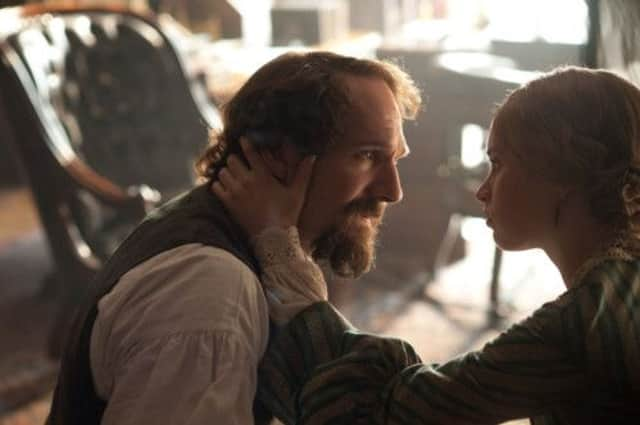Ralph Fiennes on Dickens and The Invisible Woman


RALPH Fiennes has a confession to make. “I really didn’t know much about Charles Dickens.” This might sound odd coming from someone who played Magwitch in Mike Newell’s adaptation of Great Expectations a little over a year ago and who has now directed himself as Charles Dickens in a new film, The Invisible Woman. But the actor-turned-director insists it’s true. “Weirdly, because I’d never been asked to study him on any exam syllabus, I had never pulled Dickens from the bookcase.”
Having aligned himself with Shakespeare for much of his career (training at the RSC, playing most of the Bard’s prominent roles on stage, directing and starring in a big screen version of Coriolanus), it’s simply coincidence that Fiennes should suddenly find himself so closely associated with Britain’s other most famous man of letters. Prior to signing on for Great Expectations, he’d been sent an early version of The Invisible Woman, an adaptation by Abi Morgan of Dickens biographer Claire Tomalin’s 1990 book detailing his secret affair with a young actress called Nelly Ternan.
Advertisement
Hide Ad“I was totally transported by the story of this woman, who had been the mistress of Dickens and had gone on to reclaim her life,” explains Fiennes of his reasons for making the film, which explores not only the disastrous impact the affair had on Dickens’s marriage, but also the adverse effect it had on Ternan herself, whose existence was kept secret from the public to avoid a scandal. “Abi’s screenplay really affected me and then I was totally ambushed by Claire’s biography, which was this brilliant depiction of a girl’s life and an actress’s life.”
Though Dickens was a major player in the story, Fiennes wasn’t actually all that interested in playing him in the film. “The offer had come asking if I wanted to do both and initially I said that I didn’t. And then I worked with Abi at length on the screenplay in my kitchen – Abi typing away and me doing the parts she was writing. I think I did all the parts at different times, but the part of Dickens sort of wormed its way into my consciousness I suppose, and I eventually turned round and said, ‘Yes please’.”
Given that Fiennes is famously protective of his own private life, it’s perhaps not too difficult to see why a story sympathetic to the plight of someone as famous as Dickens trying to keep his personal affairs out of the public eye would appeal.
“Sure, I’ve been in the front line of a curious press,” nods Fiennes. “That was definitely an element. [Dickens] was a man known and famous for his work and suddenly within his private life things start to shift and fall apart…” He trails off.
“I have a theory that in Victorian times people didn’t want scandal. Generally, it was uncomfortable for everyone. So, if you had all kinds of things going on in your private life that were socially unacceptable, as long as they were never socially present, it was OK.”
That kind of decorum no longer exists, reckons Fiennes. “I think there is a dangerous vicarious curiosity to which we have now become addicted. We want to know about people’s private lives. Over decades, the media have led this expectancy that we have the right to know – I don’t think that was the case at the time. Dickens was obsessively secret about his relationship, and I don’t think he would have that chance today.”
Advertisement
Hide AdOn a more positive note, now that he’s actually read some Dickens (“I had a mini binge”), he does think that Dickens’s work has a chance of connecting with modern audiences. “I think the language of Dickens really lives. Some of his scenes and descriptive passages are just breathtaking.” Indeed, Fiennes believes that the young fanbase that he accrued while playing Voldemort, left, in the Harry Potter films would be especially taken with it. “The young people who read Harry Potter, I would wager that they would devour Dickens today.”
Fiennes, though, is leaving Dickens behind for the foreseeable future. He will soon be seen in Wes Anderson’s new film The Grand Budapest Hotel, heading up a large ensemble cast for what promises to be an idiosyncratic, somewhat quixotic tale involving art thievery and scandal in Europe between the wars. Fiennes made the film – which will open next month’s Glasgow Film Festival – shortly after finishing The Invisible Woman, and just being on someone else’s set, he says, has started to feel strange now that he’s been behind the camera twice himself.“You can’t go back to the same sort of innocence,” he says. “Having done both, it’s a relief just being an actor again. But I’ve always been really curious about what decisions a director is making and now I think I’m even more curious to see what is it that I’m a part of.”
• The Invisible Woman is released on 7 February. The Grand Budapest Hotel opens the Glasgow Film Festival on 20 February and goes on general release on 7 March.